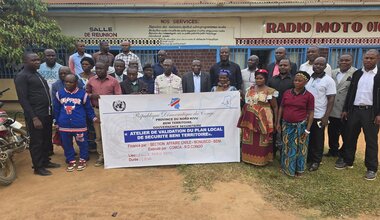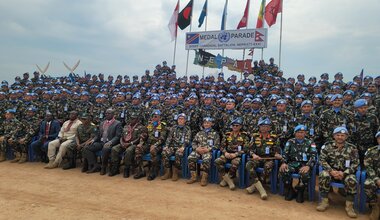South Kivu: MONUSCO, Local Authorities and Communities Engaged in Peaceful Partnership
"Today, thinking about restoring the trust means the trust has been lost following some events, some disappointments," said the Mayor of Bukavu, Meschac Bilubi Ulengabo, while welcoming his guests at a brainstorming workshop around the restoration of confidence and collaboration between MONUSCO and the population in the South Kivu province.
Organized from August 30 to 31, 2022 in Bukavu, the workshop aimed to serve as a brainstorming framework for joint analysis of the situation which led to the disruption of trust between MONUSCO and the populations in the South Kivu, in the aftermaths of the recent violent demonstrations in some areas in the east of the country demanding MONUSCO’s departure from the national territory. The demonstrators were protesting against the persistent activism by armed groups and the continued killings in the country for more than two decades.
A hundred people from different territories and the administrative capital of the South Kivu province took part in this workshop. The attendees included two former governors, members of the Provincial Assembly, mayors, law enforcement and security service members, representatives of religious denominations, traditional leaders known as the "Bwami", district chiefs, members of the civil society organizations and citizen movements, representatives of the media outlets, entrepreneurs, members of youth associations, etc.
The mayor of the city said he was convinced that "the analytical approach of the diagnosis chosen for the workshop made it possible to look at the root causes of the problems, the explanatory and aggravating factors, the consequences, challenges, future prospects of the loss of trust and collaboration between MONUSCO and the local communities in the South Kivu province”.
Upon launching the workshop, Théo Ngwabidje, the South Kivu Governor noted that the populations were "exasperated by repetitive rebellions, the many atrocities and the mind-blowing acts which they are the only ones to pay the heavy price". However, he went on to say "whilst it is true that the expression of popular anger is a legitimate right, it is also true that people should voice their aspirations quietly, in respect for public order and above all in keeping with the commitments made by our government.’’
Root causes of the broken trust
Civil society members have contributed to the search for solutions to the loss of confidence between MONUSCO and local communities. Rémy Kasindi, activist within the collective AMKA Congo (Wake up Congo) believes "the incidents which we deplore, should serve as an opportunity to pave the way for a compromise to make the country stronger and develop new, even more solid guarantees for a better living together and development".
Participants also blamed the communication gap as one of the causes of the recent protests. Nene Bintu Iragi, the vice-chair of the coordination office of the civil society Forces Vives du Sud-Kivu said this deficit is noticed “between the Government and MONUSCO, between the Government and the population, between MONUSCO and the population”. However, "this situation should not go on like this for if everything has not been rosy (..) everything has not been black either", she said.
In the same vein, the former vice-chair of the Independent National Electoral Commission and South Kivu Governor from 1998 to 2002, Norbert Bashengezi Katintima stressed the need for MONUSCO and the Government to communicate better and effectively. So, he recommended the establishment of a "permanent framework for consultation" among all the actors concerned.
MONUSCO's contribution to South Kivu was applauded
Moreover, Norbert Bashengezi Katintima recalled MONUSCO’s achievements forgotten by many people, indicating the UN Mission’s contributions to the resolution of some armed conflicts and other problems, in particular the Mutebusi war in the South Kivu, the deployment of the electoral kits and other types of supports for the electoral process ( …). “the country’s reunification is a major breakthrough. It would not be wise to forget all these."
Norbert Bashengezi also stressed that MONUSCO is not the cause of the prevailing insecurity; it dates back to long before it deployed in the DRC. On top of this, he mentioned "the administrative dimension" with the creation of the administrative entities posing problems, including cohabitation between communities. He then questioned the role of the political leaders from the areas where there is still no peace.
Wishes for an orderly withdrawal of MONUSCO
Marcellin Cishambo, another former governor of the South Kivu province was also realistic, recalling MONUSCO’s achievements. As far as he is concerned, “we need alternative solutions if MONUSCO should leave. I support MONUSCO because it prevented our country from being dismembered,” he said.
This point of view was shared by Professor Philippe Kaganda, one of the speakers, who looked at the context and the political/security dynamics in the three provinces of the eastern DRC (North-Kivu, South- Kivu, Ituri) and the consequences of MONUSCO’s withdrawal. For him, there is “a prism in the representation of the population regarding the role the UN Mission should play, finding itself practically in a situation of the negation of the State where the responsibility for national security is attributed to MONUSCO, which is a contradictory factor.”
According to Philippe Kaganda, "the anti-MONUSCO demonstrations are an indicator of the loss of trust between the United Nations Mission and the populations, this crisis is not only to be blamed on MONUSCO but beyond, on the systemic relations between internal, regional and international dynamics”. He also maintained “far from being a satisfaction proclaimed by some actors, the withdrawal of MONUSCO is a call for the responsibility for the State and all the social and political forces". He concluded by indicating "No success can be envisaged regarding MONUSCO without improved governance, without stronger public institutions, without communities’ participation to the common cause which is peace and security. »

For her part, Cecilia Piazza, Head of MONUSCO office in the South Kivu, recognized that no social undertaking can produce lasting positive results without trust between partners. In his opinion, "a new pact of confidence must factor in objective, inclusive and participatory assessment of the security context in the east of the Democratic Republic of Congo, gradual, coordinated and responsible transition process for MONUSCO’s withdrawal".
MONUSCO withdrawal’s process was explained by Essoh Essis, the coordinator of MONUSCO’s Civil Affairs section. He explained at length the transition plan, adopted by the Congolese government and MONUSCO and evoked the 18 benchmarks for a responsible withdrawal of the UN Mission from the DRC.
Initially, the agreed strategy between the DRC government and MONUSCO envisaged the withdrawal of the UN Mission by 2024. Following the July-August 2022 events, an inter-institutional meeting chaired by the Congolese Head of State instructed the government to organize a meeting with MONUSCO to reassess the withdrawal plan.
It should be noted that all these exchanges, debates and work have resulted in a certain number of recommendations, around thirty altogether concerning sectors such as security, civilians’ protection and the restoration of State authority. Regarding MONUSCO, "Within the framework of its mandate, it should step up its support to the FARDC; In addition, it should, along with UN Agencies, Funds and Programs promote and encourage a peaceful return of the displaced persons and refugees, as well as peaceful cohabitation between communities in the South Kivu".
Moreover, "DRC government, with assistance from MONUSCO and other DRC’s partners should make effective the P-DDRCS program (Disarmament, demobilization, community and social reintegration) for ex-combatants.

 UN
UN United Nations Peacekeeping
United Nations Peacekeeping






